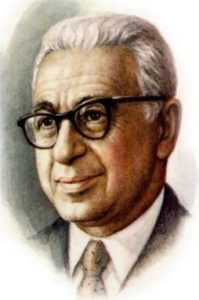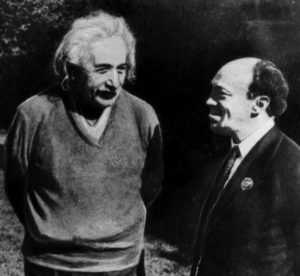In Memory of a Great Israeli Prime Minister
 Yitzhak Yezernitsky (1915-2012) was born in what is now Belarus and spent his youth in Poland. As a young man, he joined Betar, the Zionist organization founded by Ze’ev Jabotinsky. After a short time studying law at the University of Warsaw, he made aliyah and changed his last name to “Shamir”, after King Solomon’s Biblical stone-cutting tool used to construct Jerusalem’s Holy Temple. Tragically, his entire family that remained back in Europe was killed in the Holocaust. Before his father was murdered by villagers, he reportedly said: “I have a son in the Land of Israel, and he will exact my revenge.” Shamir joined the paramilitary Irgun force to fight off British rule, and later was part of the more aggressive Lehi, or “Stern Gang”. For his activities, he was imprisoned a number of times. (During one imprisonment, he met his future wife Shulamit, who had been arrested by the British for “illegal” immigration, having escaped Nazi-allied Bulgaria by boat.) In 1946, Shamir was arrested again and this time exiled to Eritrea in Africa. He managed to escape by digging a 200-foot tunnel, and found asylum in France. Shamir moved back to Israel immediately after the Declaration of Independence in 1948. He participated in the War of Independence, and later joined the Mossad. One of his main missions was Operation Damocles, to assassinate former Nazi rocket scientists helping Egypt develop missiles. He later resigned from the Mossad due to controversy over that operation. In 1973, he was first elected to the Knesset as a member of Likud. He became Foreign Minister in 1980, and Prime Minister of Israel in 1983. A hard-liner, Shamir opposed the peace treaty with Egypt, blocked a planned 1987 “regional peace conference”, and opposed the 1991 Madrid peace talks. When the Soviet Union began to fall apart in 1989, many Soviet Jews were fleeing to the United States. Shamir stepped in to stop the “insult to Israel” (as he called it) and said Soviet Jews were not refugees, since they had a home in Israel. The US changed its refugee policy and henceforth most Soviet Jews immigrated to Israel. Similarly, when the Ethiopian government collapsed in 1991, Shamir ordered Operation Solomon to airlift 14,000 Ethiopian Jews to Israel. Shamir steered the country through the difficult years of the First Intifada and the First Gulf War. During his premiership, Israel established formal relations with over a dozen countries. He stepped down as Likud leader in 1993, but continued to sit in the Knesset until 1996. It was Shamir who launched Benjamin Netanyahu’s political career by appointing him to his first post (Israel’s ambassador to the UN). He would later leave Likud due to disputes with his young protégé, and only returned to the party in 2001 to support Ariel Sharon. That year, he also received the Israel Prize for lifetime achievement. Shamir left politics entirely in 2004 due to declining health. He wrote two books, including an autobiography. He has been described as one of Israel’s bravest warriors and most influential leaders. His yahrzeit is this Sunday.
Yitzhak Yezernitsky (1915-2012) was born in what is now Belarus and spent his youth in Poland. As a young man, he joined Betar, the Zionist organization founded by Ze’ev Jabotinsky. After a short time studying law at the University of Warsaw, he made aliyah and changed his last name to “Shamir”, after King Solomon’s Biblical stone-cutting tool used to construct Jerusalem’s Holy Temple. Tragically, his entire family that remained back in Europe was killed in the Holocaust. Before his father was murdered by villagers, he reportedly said: “I have a son in the Land of Israel, and he will exact my revenge.” Shamir joined the paramilitary Irgun force to fight off British rule, and later was part of the more aggressive Lehi, or “Stern Gang”. For his activities, he was imprisoned a number of times. (During one imprisonment, he met his future wife Shulamit, who had been arrested by the British for “illegal” immigration, having escaped Nazi-allied Bulgaria by boat.) In 1946, Shamir was arrested again and this time exiled to Eritrea in Africa. He managed to escape by digging a 200-foot tunnel, and found asylum in France. Shamir moved back to Israel immediately after the Declaration of Independence in 1948. He participated in the War of Independence, and later joined the Mossad. One of his main missions was Operation Damocles, to assassinate former Nazi rocket scientists helping Egypt develop missiles. He later resigned from the Mossad due to controversy over that operation. In 1973, he was first elected to the Knesset as a member of Likud. He became Foreign Minister in 1980, and Prime Minister of Israel in 1983. A hard-liner, Shamir opposed the peace treaty with Egypt, blocked a planned 1987 “regional peace conference”, and opposed the 1991 Madrid peace talks. When the Soviet Union began to fall apart in 1989, many Soviet Jews were fleeing to the United States. Shamir stepped in to stop the “insult to Israel” (as he called it) and said Soviet Jews were not refugees, since they had a home in Israel. The US changed its refugee policy and henceforth most Soviet Jews immigrated to Israel. Similarly, when the Ethiopian government collapsed in 1991, Shamir ordered Operation Solomon to airlift 14,000 Ethiopian Jews to Israel. Shamir steered the country through the difficult years of the First Intifada and the First Gulf War. During his premiership, Israel established formal relations with over a dozen countries. He stepped down as Likud leader in 1993, but continued to sit in the Knesset until 1996. It was Shamir who launched Benjamin Netanyahu’s political career by appointing him to his first post (Israel’s ambassador to the UN). He would later leave Likud due to disputes with his young protégé, and only returned to the party in 2001 to support Ariel Sharon. That year, he also received the Israel Prize for lifetime achievement. Shamir left politics entirely in 2004 due to declining health. He wrote two books, including an autobiography. He has been described as one of Israel’s bravest warriors and most influential leaders. His yahrzeit is this Sunday.
Words of the Week
In their war against Israel’s existence, the Arab governments took advantage of the Cold War. They enlisted the military, economic, and political support of the communist world against Israel, and they turned a local, regional conflict into an international powder keg.
– Yitzhak Shamir

 Matvei Isaakovich Blanter (1903-1990) was born in the Russian Empire in a small Ukrainian town. He studied music and became a master pianist and violinist. In the 1920s, Blanter became popular for his dance and jazz songs. After the rise of Stalin, he was “recruited” to write propaganda pieces and composed some of the Soviet Union’s greatest hits. In 1938, he wrote the music for the internationally-acclaimed song “Katyusha”, by far the most well-known Russian tune in the world. (Click
Matvei Isaakovich Blanter (1903-1990) was born in the Russian Empire in a small Ukrainian town. He studied music and became a master pianist and violinist. In the 1920s, Blanter became popular for his dance and jazz songs. After the rise of Stalin, he was “recruited” to write propaganda pieces and composed some of the Soviet Union’s greatest hits. In 1938, he wrote the music for the internationally-acclaimed song “Katyusha”, by far the most well-known Russian tune in the world. (Click 
